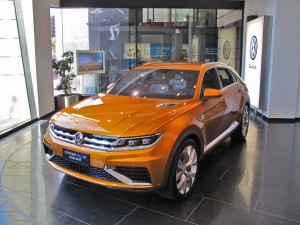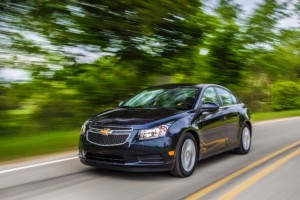
When VW's CrossBlue hits U.S. dealers, the vehicle will offer turbo diesel power plant as an option.
When Volkswagen launches its new midsize sport-utility vehicle a couple years from now you can be sure of several things. Based on the CrossBlue Concept, the crossover vehicle will feature three rows of seats – and offer an optional turbo diesel engine.
And for good reason, considering VW has led the revival of the diesel in the U.S. market. But while it might have been all but alone, a few years ago, the German maker is now just one of a growing list of manufacturers taking advantages of the American diesel revival.
For the first six months of 2014, in fact, diesel sales surged a full 25% year-over-year, compared to a 4% upturn in the overall American automotive market. By comparison, hybrid vehicles have posted a nearly double-digit decline.
“Sustained and mostly double-digit increases in sales each month over a four year period prove that U.S. consumers are embracing the benefits of clean diesel technology and its proven, high fuel efficiency, great driving performance, and long-term value,” said Allen Schaeffer, executive director of the Diesel Technology Forum.
The numbers quoted by the forum are a bit misleading, in that they don’t include pickups and vans – though with the addition of the new Chrysler clean diesel in the Ram 1500, “oil burners” are gaining traction there, as well. Nonetheless, the surge in sales of diesel-powered passenger cars and SUVs shows a significant reversal of fortune for a high-mileage technology that all but vanished from the U.S. market by the early 1990s.
Of course, today’s diesels aren’t the same as the powertrains offered two to three decades ago. Using advanced turbocharging and high-pressure fuel injection, as well as the latest emissions control systems, modern diesels not only yield about 30% better mileage than a comparable gasoline engine, but also are cleaner, quieter and smoother than diesels of decades past.
That does come at a cost, however. Those technologies – especially urea injection systems needed to reduce emissions – can add as much as $5,000 to the price tag of a diesel model.
That’s in line with the price premium for hybrids. Yet despite their own fuel economy advantages – and the huge increase in the number of gas-electric models now available – hybrid sales have taken an unexpected slide this year.
June saw a 12.7% drop in hybrid sales in the U.S., and for the first half of 2014, demand fell 9.7%. Hybrids accounted for just 2.77% of the market in June, and 3.31% for the January to June period, according to data compiled by HybridCars.com, which tracks sales trends.
For the year-to-date, diesel and hybrid sales are roughly on a par. But the diesel figure runs significantly higher on most of the models that offer the powertrain as an option. For a number of VW products, such as the Jetta and Passat, for example, it is running as high as 25%.
(Obama pushes Congress to invest in smarter roads. For more, Click Here.)
“While diesel cars and pickup trucks make up only 3% of the overall U.S. vehicle market, most analysts predict continued growth in the U.S., with many believing the diesel market will double by 2018,” noted the Diesel Technology Forum’s Schaeffer.
That will require the addition of more diesel products, however, but more are coming. Audi added three for the 2014 model-year, including versions of the Q5, A7 and A8. A diesel-powered A3 is also coming.
(Click Here for details about Saleen’s plans for the Tesla Model S.)
But not everyone is convinced of the technology’s long-term strength. Ford CEO Mark Fields recently told TheDetroitBureau.com that while the maker is following sales trends, it has no hard plans to add a diesel for the F-150 pickup or other models.
(To see how the “Lemon Law King” scored a win over Tesla, Click Here.)
And while Jeep has seen demand for the diesel version of the Grand Cherokee rise to 8%, the brand’s boss, Michael Manley, told Automotive News he wouldn’t approve a diesel for the smaller Cherokee model unless the big SUV’s take rate doubles.
Perhaps the biggest concern is the challenge – read “cost” of meeting the next generation of emissions standards. Holding down NOx and particulate levels will require still more expensive pollution control systems that, some skeptics warn, could simply push diesels beyond the reach of most buyers.


Unfortunately Obama and the EPA are doing everything they can to prevent the sales of clean, modern Diesels as they continue to push EVs that are impractical for 99+ percent of the population. This is a perfect example of bad government attempting to force inappropriate tech on the populace.
The rest of the world uses clean Diesels because they are clean, practical and fuel efficient. Obama and the EPA are in denial and blackmailing U.S. consumers as the cost to meet the absurd U.S. Diesel emissions standards – the toughest in the world, drive Diesel vehicle costs up disproportionately for car makers and consumers. All because Obama and the EPA want people to purchase impractical EVs…